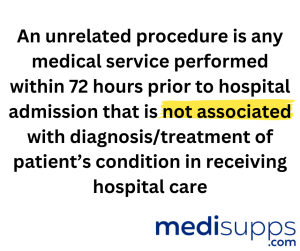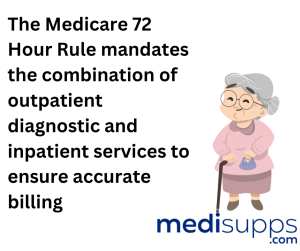
by Russell Noga | Updated November 20th, 2023
 Navigating the complexities of Medicare billing can be daunting, but understanding the rules is crucial for both patients and healthcare providers.
Navigating the complexities of Medicare billing can be daunting, but understanding the rules is crucial for both patients and healthcare providers.
Among these regulations is the Medicare 72 Hour Rule, which aims to prevent healthcare fraud by ensuring accurate billing and payment.
In this article, we’ll explore the intricacies of this rule, its impact on patients and providers, and the best practices for maintaining compliance.
Let’s demystify the Medicare 72 Hour Rule together!
Key Takeaways
- The Medicare 72 Hour Rule is an important requirement for accurate billing and payment.
- Exceptions to the rule are explored, as well as strategies for staying compliant and utilizing technology.
- The rule has a significant impact on both patients and providers by promoting transparency in healthcare services.
Understanding the Medicare 72 Hour Rule
The Medicare 72 Hour Rule, applicable to all Medicare providers such as hospitals, physicians, and other healthcare professionals, aims to prevent healthcare fraud.
It achieves this by mandating the combination of outpatient diagnostic and inpatient services, thereby ensuring accurate billing and payment under the inpatient prospective payment system.
Compliance with this rule is essential for Medicare reimbursement. However, certain services, such as electrocardiograms, electroencephalograms, and prescriptions for pain medication, are excluded from the rule and should be invoiced separately if performed within 72 hours of admission to the hospital for previously scheduled inpatient surgery.
Non-adherence to the 72 Hour Rule can have serious consequences. The Centers for Medicare and Medicaid Services (CMS) have declared that they will closely monitor claims submitted in accordance with this rule and will take necessary action if any fraud is detected, including in inpatient rehabilitation hospitals.
Diagnostic Services and the 72 Hour Rule
The 72 Hour Rule covers diagnostic services like laboratory tests and imaging. Even if provided at the hospital’s outpatient center, these services must be billed alongside inpatient services.
This bundling of services helps verify that all services were completed at the hospital’s outpatient center, reducing the risk of False Claims Act violations. Notably, the 72 Hour Rule allows the bundling of unrelated outpatient services with inpatient surgery, considering them as inpatient services for billing.
A broad spectrum of procedures falls under the 72 Hour Rule’s diagnostic services, such as:
- Hematology
- Chemistry
- Diagnostic x-rays
- Isotope studies
- Lab work
- Radiology
- Nuclear medicine
- CT scans
- Anesthesia
- Cardiology
- Physical therapy session
Healthcare providers should familiarize themselves with these services and their billing requirements to comply with the rule.
Inpatient vs. Outpatient Services
The 72 Hour Rule distinguishes between inpatient and outpatient services by requiring outpatient diagnostic services to be billed with inpatient services if they occur within 72 hours of admission.
The rule, also referred to as the three-day payment window, is applicable to diagnostic tests and other related services provided by the admitting hospital on the three calendar days preceding the patient’s admission. These services must be amalgamated and billed as part of the inpatient stay.
For outpatient services, the 72 Hour Rule mandates that any diagnostic or medical services performed within 72 hours prior to being admitted to the hospital must be incorporated into the hospital’s billing for the inpatient stay. This bundling of services ensures accurate billing and helps prevent potential fraud or overcharging.
Discover 2025 Plans & Rates
Enter Zip Code
Navigating the Exceptions
While the Medicare 72 Hour Rule plays a critical role in preventing healthcare fraud and ensuring accurate billing, there are exceptions to the rule. In some cases, unrelated procedures and non-diagnostic services can be billed separately, even if they occur within the 72-hour window.
Let’s delve deeper into these exceptions and their implications for healthcare providers.
 Unrelated Procedures and Billing
Unrelated Procedures and Billing
Unrelated outpatient procedures, even if they are diagnostic in nature, can be billed separately from inpatient services.
An unrelated procedure is defined as any outpatient diagnostic or medical services performed within 72 hours prior to being admitted to the hospital that is not directly associated with the diagnosis or treatment of the patient’s condition for which they are receiving hospital care.
To bill unrelated diagnostic outpatient services independently under Medicare Part B, providers can utilize condition code 51 when submitting the claim. However, it is important to consult the guidelines provided by CMS or the specific guidelines of the healthcare provider or payer in question to determine whether a procedure is related or unrelated to the admission.
Failing to separately bill unrelated nondiagnostic outpatient services under Medicare Part B could lead to a shortfall in revenue for the organization. By properly billing these services, healthcare providers can ensure accurate reimbursement and maintain compliance with the Medicare 72 Hour Rule.
Billing for Non-Diagnostic Services
Under Medicare Part B, non-diagnostic outpatient services which are not related to the inpatient admission can be charged separately. This is a different billing process from that of an inpatient admission.
Examples of such services include:
- Lab work
- Radiology
- Nuclear medicine
- CT scans
- Anesthesia
- Cardiology
- Osteopathic services
These considered inpatient services must be incorporated into the inpatient payment if provided within 72 hours preceding a beneficiary’s inpatient admission.
To validate separate billing for non-diagnostic services, the patient’s record must encompass the beneficiary’s diagnosis, pertinent history, rationale for the encounter, and documentation of each patient encounter. Additionally, the record should be comprehensive, legible, and incorporate any obligatory modifiers for non-covered services.
By maintaining thorough documentation, healthcare providers can ensure accurate billing and avoid potential penalties or fines.
Compliance and Record Keeping
Maintaining compliance with the Medicare 72 Hour Rule is vital for healthcare providers to avoid potential penalties and ensure accurate billing. Diligent record keeping and adherence to guidelines are key components of compliance.
The subsequent sections will detail various compliance strategies and the potential consequences of non-compliance.
 Strategies for Staying Compliant
Strategies for Staying Compliant
To ensure compliance with the 72 Hour Rule, hospitals can adopt the following strategies:
- Implementing automated billing systems complete with checks and validations
- Using electronic health records (EHR) systems
- Conducting regular audits and reconciliation processes
These strategies can aid in identifying and addressing any potential compliance issues.
Another important aspect of maintaining compliance is regular training for staff to enhance their knowledge and skills and reinforce compliance practices. Keeping up to date with Medicare Program requirements and any changes to the rule can also help providers stay compliant and avoid potential pitfalls.
Penalties for Non-Compliance
Non-compliance with the 72 Hour Rule can result in serious penalties for healthcare providers. Hospitals that fail to abide by the rule may be liable for significant penalties, including fines.
The exact fines and penalties may vary according to the circumstances and extent of the non-compliance. It is advisable to consult official sources, such as the Centers for Medicare and Medicaid Services (CMS), for precise information on the fines and penalties linked to non-compliance.
Participating hospitals and physicians who negligently violate the rule may be subject to a civil monetary penalty, with a maximum amount of $50,000 for hospitals and $25,000 for physicians. Healthcare providers must comply with the 72 Hour Rule to dodge such penalties and preserve their reputation and financial stability.
 Utilizing Technology for Compliance
Utilizing Technology for Compliance
Technology can significantly aid hospitals in maintaining compliance with the 72 Hour Rule. By using computer assisted audit techniques, auditors can query and analyze vast amounts of data, such as patient records and financial transactions, to identify potential risks, errors, or compliance issues.
These techniques can also be used to examine billing data to detect any occurrences of unbundling or improper billing practices.
Nonetheless, awareness of the challenges and limitations of using technology for compliance with the Medicare 72 Hour Rule is crucial.
These may include:
- Increased administrative costs
- Potential unintended consequences of electronic health records (EHRs)
- Technical risks
- Regulatory considerations
Despite these challenges, technology can be a valuable tool for hospitals in ensuring compliance with the rule and avoiding potential penalties.
Impact on Patients and Providers
The Medicare 72 Hour Rule has a significant impact on both patients and providers. The rule promotes transparency in healthcare services by ensuring accurate billing and preventing overbilling and fraud.
Patients benefit from the rule as it requires all outpatient diagnostic or medical services provided within 72 hours of hospital admission to be incorporated into the inpatient payment, preventing them from being charged for duplicate or unnecessary procedures.
The rule also impacts healthcare providers by mandating that certain services be delivered within a 72-hour timeframe for reimbursement.
By adhering to the Medicare 72 Hour Rule and maintaining accurate documentation, healthcare providers can ensure they receive proper reimbursement for their services and maintain a transparent billing process for their patients.
Compare Medicare Plans & Rates in Your Area
Summary
In conclusion, the Medicare 72 Hour Rule plays a crucial role in preventing healthcare fraud and ensuring accurate billing for both patients and providers.
By understanding the intricacies of this rule, healthcare providers can maintain compliance, avoid potential penalties, and promote transparency in their billing practices.
As the healthcare landscape continues to evolve, staying informed and adopting best practices is essential for providers to navigate the complexities of Medicare billing and provide the best possible care for their patients.
Compare Plans & Rates
Enter Zip Code
Frequently Asked Questions
What’s the 72 hour rule?
The 72 hour rule is a part of the Medicare Prospective Payment System, which states that any outpatient diagnostic or other medical services performed within 72 hours prior to hospital admission must be bundled into one bill. The rule also applies to procedures done on one day followed by a combination procedure performed up to 72 hours after the initial date, with correct coding and bundling rules applied. Additionally, it suggests that emotions should be held back for 72 hours before coming to any conclusion.
What are the exceptions to the CMS 72 hour rule?
The exceptions to the CMS 72 hour rule are that if the non-diagnostic outpatient services are related to the inpatient admission, they must be considered inpatient services and cannot be billed separately under Medicare Part B.
What is the condition code 72 for Medicare?
Occurrence Span Code 72 is used to identify the total number of midnights spent in hospital (both inpatient and observation) for Medicare patients, including nights spent in a transferring facility.
How is the three 3-day qualifying stay calculated by CMS?
The three 3-day qualifying stay is calculated by CMS by having the patient stay 3 consecutive days in one or more hospitals, where the admission day is counted but not the discharge day. Time spent in the ER or outpatient observation before admission does not count towards the 3-day rule.
What is the purpose of the Medicare 72 Hour Rule?
The Medicare 72 Hour Rule is designed to protect against healthcare fraud by combining outpatient and inpatient services for accurate billing and payment.
Find the Right Medicare Plan for You
Acquiring the right Medicare plan doesn’t have to be confusing. Whether it’s a Medigap plan, or you have inquires about Medicare Advantage or Medicare Part D, we can help.
Call today at 1-888-891-0229 and one of our knowledgeable, licensed insurance agents will be happy to assist you!

Russell Noga is the CEO and Medicare editor of Medisupps.com. His 15 years of experience in the Medicare insurance market includes being a licensed Medicare insurance broker in all 50 states. He is frequently featured as a featured as a keynote Medicare event speaker, has authored hundreds of Medicare content pages, and hosts the very popular Medisupps.com Medicare Youtube channel. His expertise includes Medicare, Medigap insurance, Medicare Advantage plans, and Medicare Part D.



